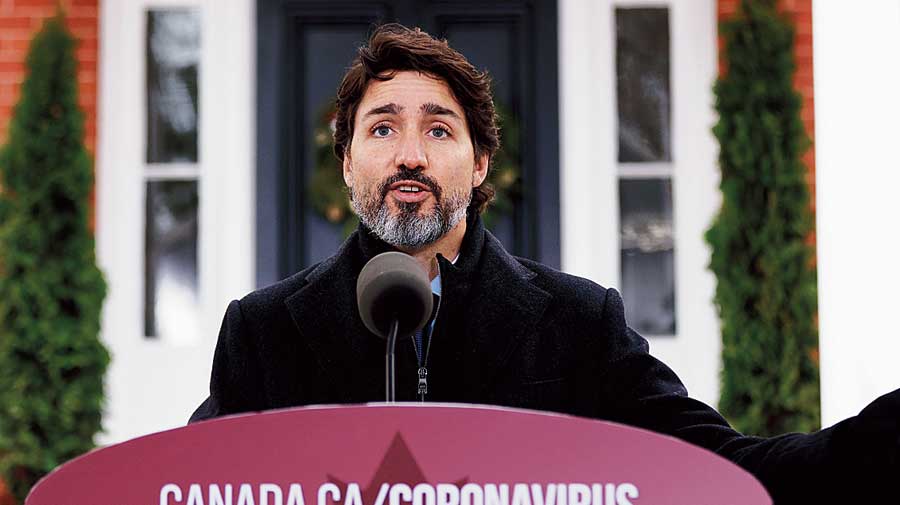Canadian Prime Minister Justin Trudeau has expressed concern about the farmers’ agitation and spoken up in support of the right to peaceful protest, upsetting the Indian government which spoke of “ill-informed comments by Canadian leaders” and described them as “unwarranted”.
The Congress echoed the Centre’s stand that the Canadian comments amounted to interfering with India’s internal affairs.
But at least one veteran diplomat pointed out that it was rude to call Trudeau names when Prime Minister Narendra Modi himself had echoed Donald Trump’s “Abki baar” slogan at the Howdy Modi event in Texas in 2019.
Addressing the Sikh community of Canada during the birth anniversary celebrations of Guru Nanak, Trudeau said: “I would be remiss if I didn’t start by recognising the news coming from India about the protest by farmers. The situation is concerning. We are all very worried about family and friends. We know that’s a reality for many of you. Let me remind you, Canada will always be there to defend the rights of peaceful protesters. We believe in the process of dialogue. We’ve reached out through multiple means to the Indian authorities to highlight our concerns. This is a moment for all of us to pull together.”
Prior to Trudeau speaking out, his defence minister Harjit Sajjan had tweeted on Sunday: “The reports of peaceful protesters being brutalized in India are very troubling. Many of my constituents have family there and are worried about the safety of their loved ones. Healthy democracies allow peaceful protest. I urge those involved to uphold this fundamental right.’’
The New Democratic Party, led by Jagmeet Singh, started a petition urging “Trudeau to condemn the violence and make a clear statement calling on the Indian government to engage in peaceful dialogue rather than violence”. Simultaneously, several diaspora organisations had also begun mobilising opinion in Canada on the protests online.
Although it was Trudeau’s remarks that drew a response from the external affairs ministry, the official reaction did not mention him by name.
Responding to media queries, official spokesperson Anurag Srivastava said: “We have seen some ill-informed comments by Canadian leaders relating to farmers in India. Such comments are unwarranted, especially when pertaining to the internal affairs of a democratic country. It is also best that diplomatic conversations are not misrepresented for political purposes.”
Congress national spokesperson Shama Mohamed said: “I am against the farm bills passed by the present government without taking our farmers into confidence but that doesn’t give any right to the Canadian PM to meddle in our internal matters. We are a sovereign nation and know very well how to carry on with our matters.”
Trudeau was essentially catering to his constituency when he spoke up for the protesting farmers. At least five members of his cabinet have their roots in Punjab. Sikhs account for roughly 1.4 per cent of Canada’s population. This is just a little less than the proportion of Sikhs in India, which stands at 1.72 per cent.
Commenting on India’s response to the remarks by Canadian politicians, retired diplomat K.C. Singh tweeted: “MEA rudely calls him (Trudeau) ‘ill informed’. Convenient double standards! PM Modi can gather diaspora abroad & raise ‘Abki Baar’ slogans. But their Ldrs mustn’t address diaspora fears about their relatives/India.”
Trudeau had used his week-long India visit in 2018 also for establishing a cultural connect with the native place of a sizable number of Canadians just ahead of the federal elections in 2019. That visit was mired in controversy over Sikh separatist Jaspal Atwal — who was in India on a valid visa — turning up at an event he attended in Mumbai, forcing the Canadian high commission to withdraw the invitation to him to attend the official reception for the visiting Premier.











